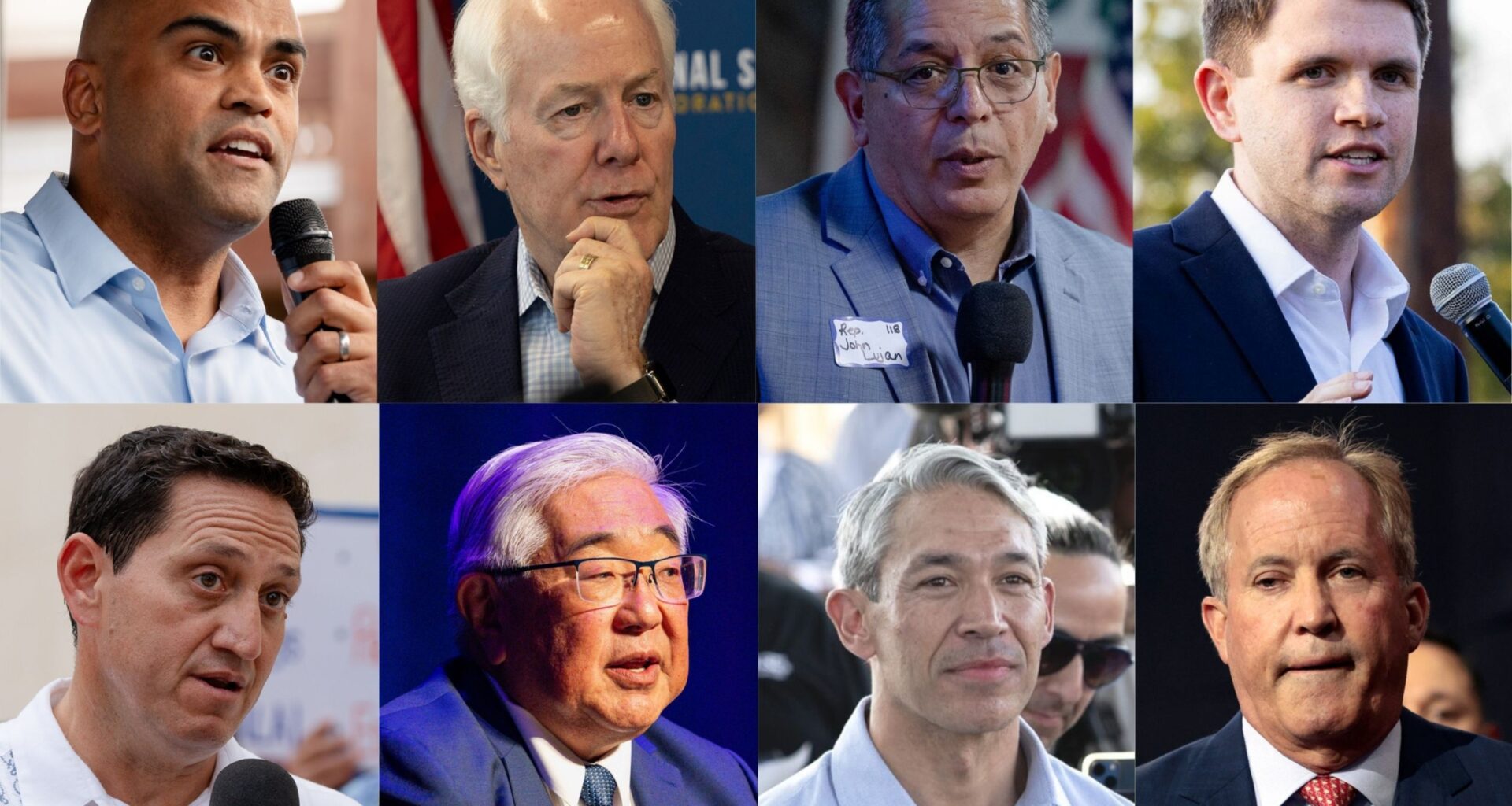Congressional districts are changing, longtime leaders are heading for the exits and a popular former mayor is trying to unseat a sitting county judge from his own party.
The 2026 midterm election may seem far off, but the March primary election where parties choose their nominees for those races is already well underway.
In non-presidential election years like 2026, members of Congress and and the Texas House are all up for reelection — election cycles that are often referendums on the party controlling the White House and cause its members to lose seats.
So-called midterm elections are also when Texas elects its governor and other statewide officeholders to four-year terms. Most countywide offices are on that same ballot, plus a portion of Bexar County’s judges and county commissioners, which serve staggered terms.
In a state that’s overwhelmingly red and a county that’s overwhelming blue, the primary is often the main event, advancing many candidates who won’t face a competitive race in November.
But as Texas takes on a bigger role in the battle for the control of the U.S. House and Senate, both national parties will also be focused on the state’s March primary, where San Antonio voters will help choose the candidates for some of the most hard-fought races in the country.
With weeks left before the Dec. 8 filing deadline, the March 3 primary is already poised to create more change among Bexar County’s federal, state and local officials than any election in recent memory.
“You’re looking at, potentially, a new county judge, you’ll have a new district attorney, you have a couple of new congressmen, and as many as four or five new state House members,” said San Antonio political strategist Kelton Morgan, who typically works with Republicans. “That’s a lot more turnover than Bexar County usually sees.”
At the same time, the Trump administration’s push to shore up a razor-thin U.S. House majority by redrawing Texas’ congressional districts this summer has led to last-minute back-and-forth about whether the changes made were legal, even after the filing period opened.
On Friday the Supreme Court ordered Texas to continue under the new maps for now, but it still hasn’t made a final decision on which ones will be the law of the land in 2026.
“This has been quite the circus and so many dominoes haven’t even fallen,” said Brielle Insler, a San Antonio-based political consultant who typically works with progressive candidates and causes.
This list will be updated periodically we get a clearer picture of the landscape. But for now, here are the top eight races the reporters and editors of the San Antonio Report are watching in the March 3 primary.
1. Bexar County Judge — Democratic primary
County judges aren’t subject to term limits in Texas, and historically they’ve tended to stick around. That’s changed some in recent years, however, as ambitious newcomers replaced longtime incumbents, turning a bureaucratic role into more of a political launchpad.
Bexar County looked poised to follow that trend when longtime County Judge Nelson Wolff retired in 2022, but in a three-way primary with several earlier-career, more partisan Democrats running, voters chose Peter Sakai.
The longtime district court judge best known for his work on the Children’s Court edged the others out by vowing to refocus the county’s limited resources around core responsibilities like overseeing the courts, the jail and elections.
Now in his first reelection race, Sakai faces an unusual challenge from former Mayor Ron Nirenberg, a fellow Democrat who says the county’s chief executive could take on much more.
Sakai contends Nirenberg should have followed through on plans to challenge one of Texas’ many Republican officeholders, instead of creating “a Dem vs. a Dem fray.”
 Bexar County Judge Peter Sakai speaks to Taiwanese delegates and San Antonio leaders before their meal at Best Quality Daughter on Thursday, Aug. 28, 2025. Credit: Amber Esparza / San Antonio Report
Bexar County Judge Peter Sakai speaks to Taiwanese delegates and San Antonio leaders before their meal at Best Quality Daughter on Thursday, Aug. 28, 2025. Credit: Amber Esparza / San Antonio Report
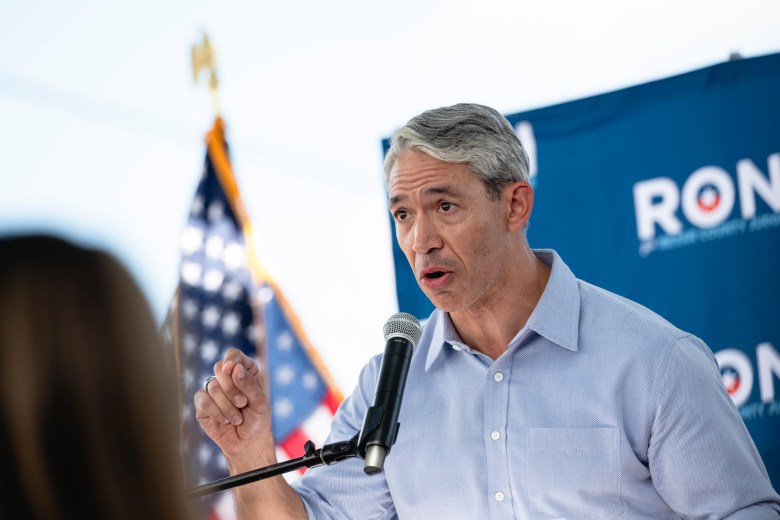 Ron Nirenberg, former mayor of San Antonio, announces his campaign for Bexar County Judge at Backyard on Broadway on Saturday, November 15, 2025. Credit: Jo E. Norris for the San Antonio Report
Ron Nirenberg, former mayor of San Antonio, announces his campaign for Bexar County Judge at Backyard on Broadway on Saturday, November 15, 2025. Credit: Jo E. Norris for the San Antonio Report
The two men seemed to get along when Nirenberg was mayor, but frustration from the business community about Sakai’s cautious approach to a new downtown Spurs arena may have cracked the window of opportunity open just as Nirenberg was terming out of office.
The county ultimately pulled through with its portion of the arena funding, however, leaving a race that’s now more about leadership styles than true policy differences.
Sakai has had three years to stockpile campaign cash without the same restrictive contribution limits as city candidates. Meanwhile Nirenberg has a PAC he can use to raise money for this race — though its name suggests bigger eventual ambitions.
Interestingly, the candidates’ old political consultants swapped sides for this race.
Excitement likely ebbs in this race after the primary, since Republicans haven’t won a countywide office in Bexar County for more than a decade. Their nominee Trish DeBerry took just 39% of the vote in 2022.
2. Texas House District 121 — Republican primary
Republicans control a whopping 88 seats in the 150-member Texas House, so most of the policy disputes are with each other, not Democrats.
This year the issues driving a wedge between Texas Republicans are a little different, having already nixed Democratic chairmanships and approved a school voucher program last session. But Texas House District 121 once again finds itself at the center of a GOP proxy war — making it likely to be one of the most expensive legislative primaries in the state.
State Rep. Marc LaHood (San Antonio) was one of many successful GOP insurgents in 2022, defeating a once-loyal Republican who bucked Gov. Greg Abbott’s school voucher plan and fell victim to a Texas conservative movement that’s been so successful wiping out moderates in red territory, it’s had to seek out new targets.
Such fights between more business-centric and socially conservative Republicans have taken many shapes over the years, but now seem to coming down to tort reform advocates, who want to make it harder to extract big payouts from suing businesses, versus trial lawyers, who make their money that way.
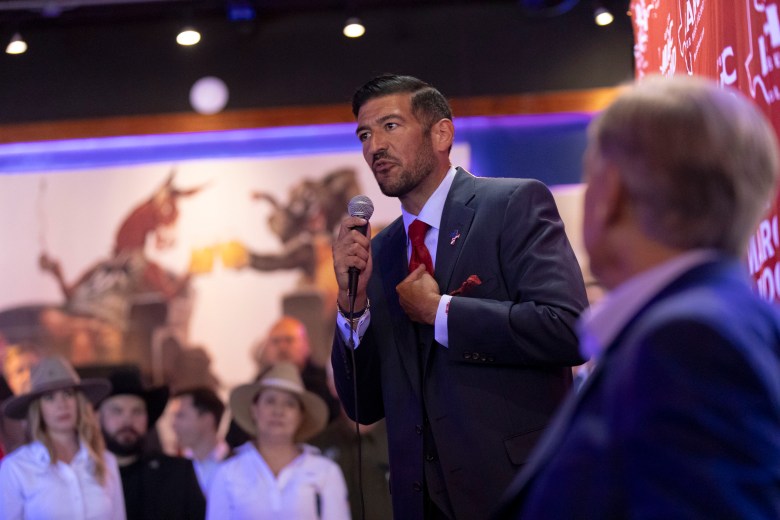 Marc LaHood, a candidate for Texas House of Representatives (R-121) appeals to voters along with Governor Greg Abbott at the Angry Elephant. Credit: Scott Ball / San Antonio Report
Marc LaHood, a candidate for Texas House of Representatives (R-121) appeals to voters along with Governor Greg Abbott at the Angry Elephant. Credit: Scott Ball / San Antonio Report
LaHood, a criminal defense attorney, was part of a group of lawyers in the House Republican Caucus — including House Speaker Dustin Burrows (R-Lubbock) — that bucked powerful business interests on their priority legal reform legislation near the end of his first term.
Now the deep-pocketed group Texans for Lawsuit Reform (TLR), which already had beef with the conservative wing going into the session, has vowed to replace the GOP lawmakers who stopped their momentum.
Meanwhile trial lawyers who benefitted from the move but typically give to Democrats are spending big to help their new allies in the GOP.
LaHood faces a primary challenge from David McArthur, a business consultant and alumnus of the George W. Bush White House who wants to test whether there’s still a lane for a more business-centric Republican in the old Joe Straus district.
McArthur is already getting big help from TLR’s unusually early TV ads attacking LaHood, while a PAC aligned with trial lawyers have been coming to the incumbent’s defense.
It’s unclear whether Abbott gets involved this time, but LaHood remains popular with conservative groups and seems to have a new ally in Burrows, appearing by his side at a San Antonio fundraiser this month.
The Northside state House district has long favored Republicans. Democrats keep hoping it might swing the other way if the GOP nominees kept getting more conservative, but LaHood still won by 5 percentage points in 2024.
3. Bexar County DA — Democratic primary
Democrats are starting to pile into this race after District Attorney Joe Gonzales (D) announced plans to retire at the end of his term, and the most likely successor took his name out of contention just before the filing period opened.
Gonzales rode in with a class of progressive DAs elected across the country in 2018, helped by a national justice reform PAC that poured roughly $1 million into Gonzales’ race that year.
It’s unclear whether that kind of outside money still exists for such local races. But in a blue county, many candidates are still talking about progressive justice policies, even as they seek to differentiate themselves from a polarizing incumbent.
Among those campaigning for the Democratic nomination are prosecutors Oscar Salinas and Angelica Carrión Powers, and criminal defense attorneys Veronica Legarreta and Shannon Locke.
Two higher-profile names, state Rep. Trey Martinez Fischer (D-San Antonio) and former Fourth Court of Appeals Justice Luz Elena Chapa (D), are also both considering the race.
Republicans remain frustrated with the DA’s office in Bexar County, but after putting big money behind their nominee in 2022 and coming up 10 percentage points short, the GOP primary hasn’t drawn the same interest.
4. U.S. Senate race — both Republican and Democratic primaries
Nearly all of Texas’ statewide offices are on the ballot this year, and all of them are longshots for Democrats in November.
Of those, however, the U.S. Senate race is getting most of the attention because national Democrats seeking to flip a 53-seat Republican majority don’t have many better options of choose from — senators serve staggered six-year terms and the GOP incumbents up for reelection this cycle come from really red states.
Meanwhile, national Republicans are defending a lot of Senate seats up in 2026, and really don’t want to waste money in a state as big and expensive as Texas.
Republican John Cornyn has held one of Texas’ two U.S. Senate seats for more than two decades, and at one point looked headed toward retirement after his bid to replace longtime Majority Leader Mitch McConnell fell flat.
But then Attorney General Ken Paxton’s interest in the race alarmed the party’s largest supporting PACs, whose leaders started openly worrying that his political baggage could cause them problems defending the seat if he’s their nominee in November.
Despite Paxton’s highly public affair and 2023 impeachment vote supported by roughly two-thirds of his GOP colleagues in the Texas House, he’s now cleared of most legal troubles and remains highly influential among GOP primary voters.
While national GOP money is flowing to help Cornyn, a third candidate who hoped he’d step aside is now also running, further complicating the matter.
U.S. Rep. Wesley Hunt (R-Houston) was asked not to run by party leaders, but is now out there making the case that neither Cornyn nor Paxton can hold this seat long-term in a changing state, and getting help from a PAC that spent roughly $6.5 million on his behalf before he’d even joined the race.
As for the Democrats, who haven’t won a statewide race in Texas since 1994, hope springs eternal and the idea of running against Paxton was so enticing that multiple candidates jumped into the Senate race this year — messing up plans to spread talent across a slate of statewide races all up in 2026.
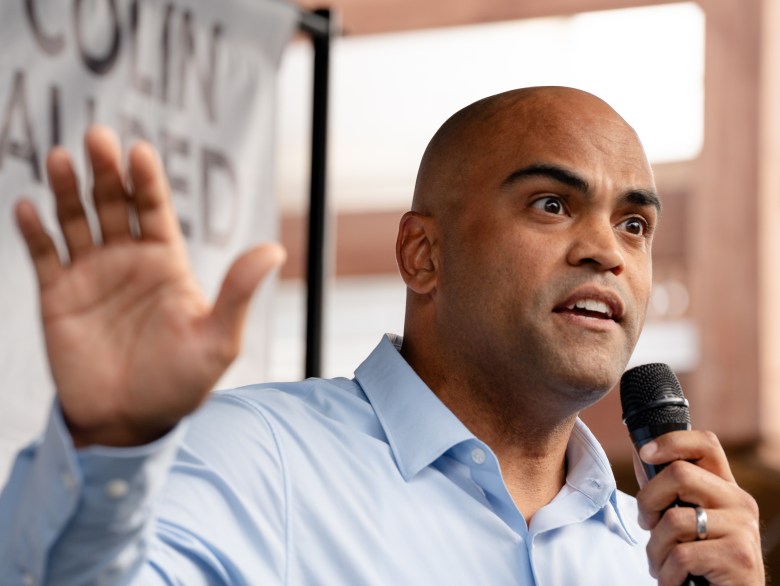 Democratic candidate for U.S. Senate Collin Allred campaigns at the Backyard on Broadway in 2024. Credit: Brenda Bazán / San Antonio Report
Democratic candidate for U.S. Senate Collin Allred campaigns at the Backyard on Broadway in 2024. Credit: Brenda Bazán / San Antonio Report
 State Rep. James Talarico speaks at a Town Hall at Stable Hall on Friday June 27. Credit: Brenda Bazán / San Antonio Report
State Rep. James Talarico speaks at a Town Hall at Stable Hall on Friday June 27. Credit: Brenda Bazán / San Antonio Report
Right now, top contenders in the Democratic primary include former U.S. Rep Colin Allred (D-Dallas), an ex-NFL player who raised big money for an unsuccessful race against U.S. Sen. Ted Cruz (R-Texas) in 2024, and state Rep. James Talarico (D-Round Rock), a millennial seminarian with a big social media following.
Both worry they could be upstaged by U.S. Rep. Jasmine Crockett (D-Dallas), whose outspoken criticism of President Donald Trump has made her popular with the base, but somewhat of a wild card running statewide in Texas.
It once looked like this race could feature a local candidate as well, but U.S. Rep. Joaquin Castro (D-San Antonio) said at the Texas Tribune Festival this month he’s most likely running for reelection to his safely blue U.S. House seat instead.
5. Texas House District 125 — Democratic primary
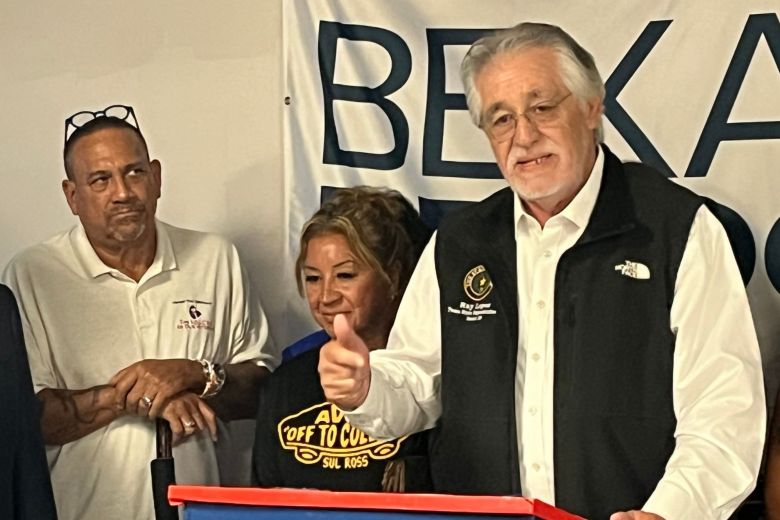 State Rep. Ray Lopez (D-San Antonio) at the Bexar County Democrats headquarters on Wednesday, Nov. 19, 2025. Credit: Andrea Drusch / San Antonio Report
State Rep. Ray Lopez (D-San Antonio) at the Bexar County Democrats headquarters on Wednesday, Nov. 19, 2025. Credit: Andrea Drusch / San Antonio Report
The San Antonio area’s Texas House delegation is made up of mostly longtime Democrats who face little opposition returning to Austin each session, even as Republicans further marginalize them in the legislative process.
But this year offers a rare opening for ambitious newcomers, as state Rep. Ray Lopez (D-San Antonio) retires from a deep blue Westside seat.
The growing field of contenders so far includes Lopez’s former chief of staff, Donovon Rodriguez, and an SAISD teachers’ union leader Adrian Reyna, among others who want to see the party fight back harder against Republicans.
6. Texas’ 35th Congressional District — Republican primary
This summer’s redistricting effort took this solidly blue Austin-to-San Antonio district and turned it into a potential GOP pickup on San Antonio’s Southeast side.
Doing so drew progressive incumbent Greg Casar (D-Austin) out the district and left him to compete for a more Austin-centric seat instead, while spurring lots of interest among local Republicans who haven’t had many opportunities to move up.
If the federal court’s Nov. 18 ruling stands and Texas’ new districts are thrown out, Casar says he’ll run here again, leaving a long list of Republicans to decide whether the race is still winnable.
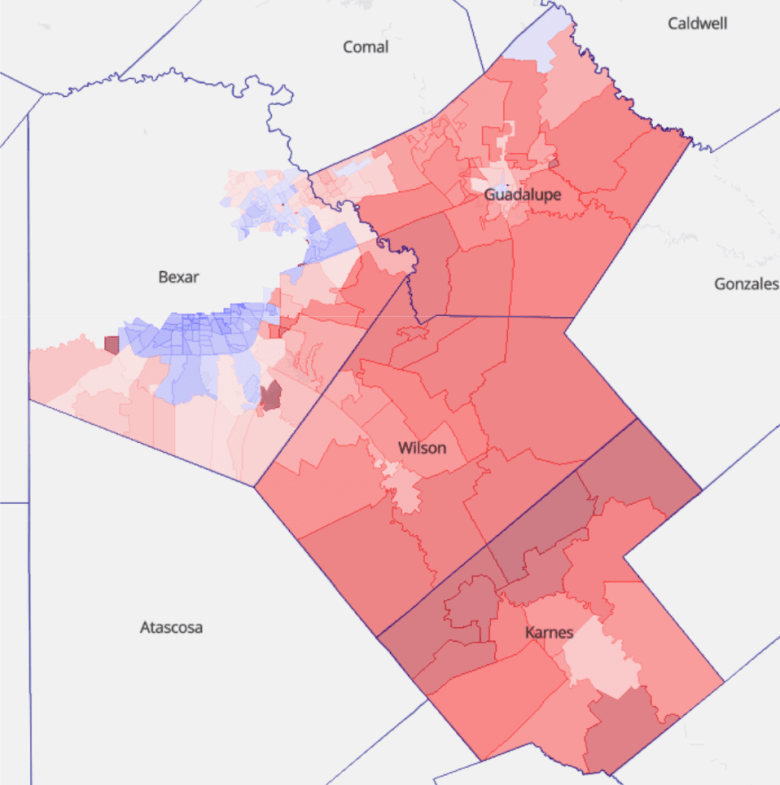 Republicans are hopeful the Supreme Court allows Texas to use maps that make Texas’ 35th Congressional District into a district Trump would have carried by 10 percentage points. Credit: Courtesy / Texas Majority PAC
Republicans are hopeful the Supreme Court allows Texas to use maps that make Texas’ 35th Congressional District into a district Trump would have carried by 10 percentage points. Credit: Courtesy / Texas Majority PAC
Conversely, if the Supreme Court decides the new maps can be used, the GOP field could grow even larger, potentially adding Bexar County Commissioner Grant Moody (Pct. 3) to the mix.
Right now the Republican primary includes state Rep. John Lujan (R-San Antonio), former congressional staffer Josh Cortez, and, Carlos De La Cruz, the brother of U.S. Rep. Monica De La Cruz, all of whom ran expecting the district to stretch from Southeast San Antonio into three counties Trump won in 2024.
Democrats have been on the fence about whether that new district would be competitive for them, but Marine Corps veteran John Lira and former Bexar County Sheriff’s Deputy Johnny Garcia are both running to give Republicans a fight.
7. Texas’ 21st Congressional District — Republican primary
U.S. Rep. Chip Roy (R-Dripping Springs), easily the most outspoken conservative in San Antonio’s five-member congressional delegation, is running to replace Paxton as Attorney General, and the race to replace him once looked like it’d be a brutal GOP primary.
The district includes part of Northwest San Antonio, but also stretches up to the Hill Country to pull in some of the most conservative parts of the state.
Under new boundaries, it would have given President Donald Trump 60.2% of its vote in 2024, similar to how it performed under the existing lines.
There’s one local candidate in the mix, former Bexar GOP Vice Chair Kyle Sinclair, though Councilman Marc Whyte (D10) and Moody both considered running.
Since then it’s drawn interest from several high-profile contenders likely to raise big money, including Trey Trainor, a former chair of the Federal Elections Commission, and former MLB player Mark Teixeira. Most Republicans now believe it’s Teixeira’s to lose.
8. Texas House District 118 — Republican primary
This Southside state House district was once a blue stronghold before Lujan flipped it for Republicans — something many in the party believed no one else could pull off.
In 2024, however, Trump actually carried the district by a wider margin than Lujan, and now number of candidates think they can hold it as Lujan moves over to run for Congress.
Interestingly, those seeking the GOP nomination include two party-switchers, personal injury attorney Desi Martinez and former state lawmaker Leo Pacheco, who once represented the district as a Democrat.
There’s also a think tank scholar who worked on school vouchers, Jorge Borrego.
Democrats look likely to renominate their candidate from last cycle, Kristian Carranza, a longtime political operative who raised more money than any first-time state House candidate in her debut race.
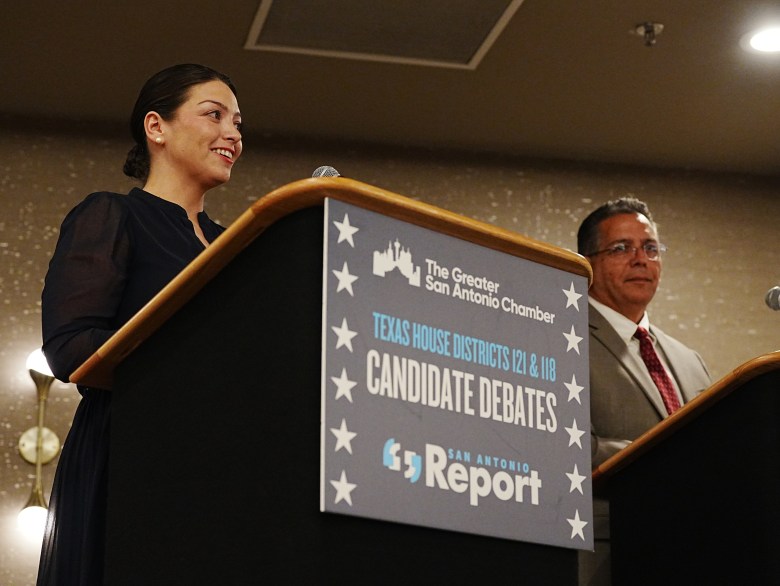 District 118 challenger Kristian Carranza (D) and Rep. John Lujan face off in a San Antonio Report debate in October 2024. Credit: Brenda Bazán / San Antonio Report
District 118 challenger Kristian Carranza (D) and Rep. John Lujan face off in a San Antonio Report debate in October 2024. Credit: Brenda Bazán / San Antonio Report
Texas House District 118 remains one of just a handful of state legislative seats that’s considered truly competitive in November.
It’s unclear whether Lujan would return for a rematch if the federal court’s Nov. 18 ruling stands and his congressional race is upended.
Also worth a watch
Bexar County District clerk — Former Bexar Democratic Party Chair Monica Ramirez Alcántara is challenging an incumbent, Gloria Martinez, who won the seat by defeating an incumbent Democrat in 2022. Alcántara has faced ethics fines for delinquent campaign finance reports, but her years of work as party chair has helped her rally support from many local elected officials.
Texas House District 116 — If Martinez Fischer jumps into the District Attorney race, it would open up a deep blue seat on the near-west to Northwest side.
Former state Rep. Diana Arévalo (D-San Antonio) said she’d consider running again. Former District 8 City Council candidate Sakib Shaikh is also looking at the Democratic primary.
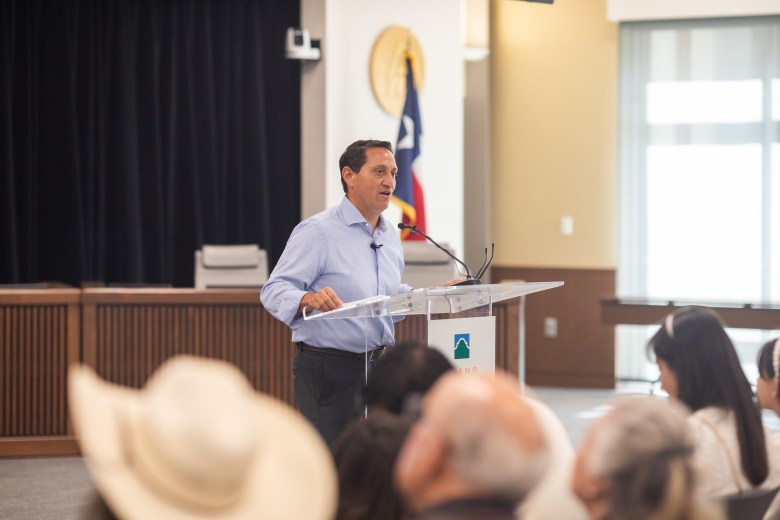 Texas State Rep. Trey Martinez Fischer discusses the current legislative session during a town hall at Alamo Colleges on Saturday May 12. Credit: Vincent Reyna for the San Antonio Report
Texas State Rep. Trey Martinez Fischer discusses the current legislative session during a town hall at Alamo Colleges on Saturday May 12. Credit: Vincent Reyna for the San Antonio Report
Texas House District 117 — Incumbent state Rep. Phil Cortez (D-San Antonio) faces a primary challenger, Robert Mihara, who says he should have participated in the quorum break aimed at slowing Texas Republicans’ redistricting efforts. It remains to be seen whether progressive outside groups feel the same way.
Texas 23rd Congressional District — U.S. Rep. Tony Gonzales (R-San Antonio) narrowly survived his 2024 primary against YouTuber Brandon Herrera, who is now running again this year.
Last election cycle, the primary challenge came as Gonzales was facing major pushback from the state GOP, some of which seems to have cooled off since then. However, some political watchers believe having Paxton on the ballot in the high-profile U.S. Senate primary could boost other down-ballot insurgents like Herrera.
Texas’ 28th Congressional District — This summer’s redistricting effort removed the Bexar County portion of U.S. Rep. Henry Cuellar’s (D-Laredo) district, ostensibly making it more friendly to Republicans, and leaving this region with four congressional seats instead of five.
Republicans consider this one of their best pickup opportunities nationwide, but even under indictment, Cuellar has been unsinkable, and it’s unclear who the GOP will get through their primary to run against him.
Texas Attorney General — Texas hasn’t had an open statewide position in a decade, until Paxton decided to run for U.S. Senate. A host of interesting Republicans and Democrats have lined up for it and are worth watching in March.
